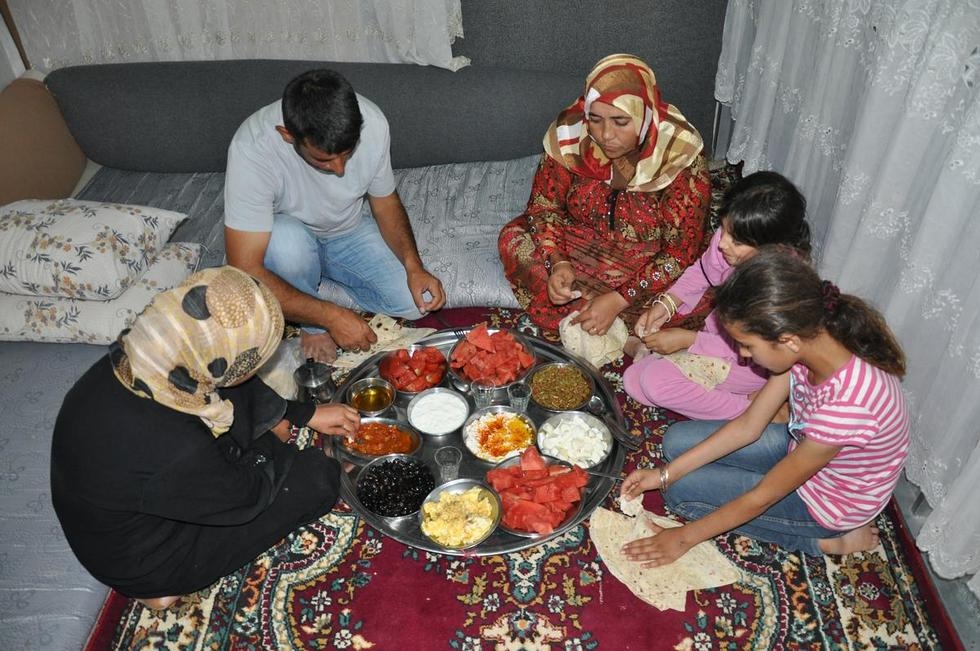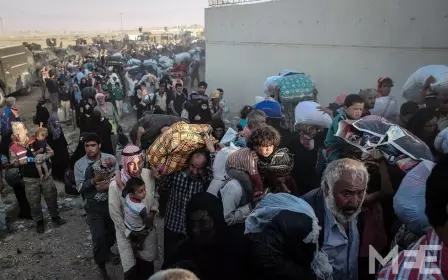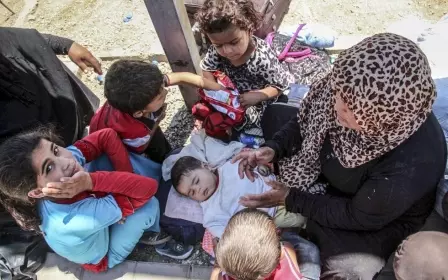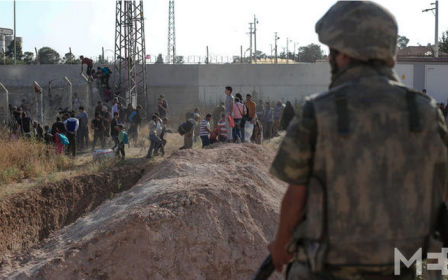Bittersweet Ramadan joy of Syrians on Turkish border

By Nilay Kar Onum
AKCAKALE, SANLIURFA, Turkey - With the azan -- the Islamic call to prayer -- finally ringing out, everybody went into their tents to break their 17-hour fast on the first day of Ramadan.
For these Muslims however, their iftar meal will be held on foreign soil.
Thousands of Syrian refugees in southeastern Turkey are welcoming Ramadan in emergency accommodation for the fifth time.
A special time of year for many Muslims, this Ramadan is mixed with a bittersweet joy as these people remain separated from their nation after the devastating civil war which erupted in March 2011 and claimed more than 211,000 lives so far.
During the month of Ramadan, Muslims fast from dawn to sunset.
Anadolu Agency witnessed preparations for iftar dinners in Suleyman Shah Accommodation Facility in the Akcakale district of southeastern Sanliurfa province and attended a fast-breaking dinner with a Syrian family in their tent.
The busy hours for Ramadan in the huge center -- which hosts around 30,000 people -- start after 5 p.m. local time. Women speeded up their cooking. Men and children poured along markets established in the center.
Soup, salad, cold beverages, pita bread and the traditional Ramadan fruit of dates are essential parts of many people’s iftar menu. Depending on the people, the menu changes.
Thirty-five year-old Sevsen Cerat is a housewife who has been staying at the center for around three years.
Along with her four children and her brother, she prepared four types of meals, which included lentil soup, pilaf with chicken meat, salad and kibbeh -- a Levantine dish made of cracked wheat and minced onions.
Cerat, a mother of four children, was both happy to welcome Ramadan in a secure atmosphere and was also sad because she is separated from family members.
“At our previous iftar dinners in Syria, we were getting together with my all family members around a table and breaking our fast together.
“My mother used to host us on the first day of Ramadan," Cerat says, recalling her memories tearfully: "Now, I am neither together with my mother nor sisters nor my husband."
Cerat left Damascus for Turkey because of the dangerous environment but her sisters and mother still live in Deir ez-Zor city, while her husband -- a firefighter -- works in Germany.
Syrians at the center are thankful and happy to Turkey for providing them with a livable atmosphere but many still suffer from traumatic memories which prevent them from living a completely happy life.
"My brother was killed during a bombardment [in Deir ez-Zor.] My sister's son and nephew were also killed. It is not possible to delete them from our memories easily," says Halsa Tallah, 53, a housewife, marking her third Ramadan in Turkey.
"The thing that we’ve missed most is to be in our homeland and in our homes during Ramadan," she adds: "Except that, thank God, we are doing OK here."
Halil al-Muslim, who has been living in the camp for around one year after fleeing his home in Deir ez-Zor, marked Ramadan in the center for the first time.
On the first day of the holy month, Muslim preferred to break his fast at a 1,000-people mass iftar dinner organized by Turkey’s Prime Ministry Disaster & Emergency Management Authority.
Half an hour before the call to prayer is heard, many people created lines to be able to attend the event, which will be held every evening this month.
"Our aim is to make Syrians feel like they are in their home," says Mehmet Dikec, an official at the Suleyman Shah Accommodation Facility.
And, it seems, they have reached their aim.
"Even just this moment is enough to make me feel better than the days I lived through during the last four years in Syria. What else can I say?” Muslim remarks.
Middle East Eye propose une couverture et une analyse indépendantes et incomparables du Moyen-Orient, de l’Afrique du Nord et d’autres régions du monde. Pour en savoir plus sur la reprise de ce contenu et les frais qui s’appliquent, veuillez remplir ce formulaire [en anglais]. Pour en savoir plus sur MEE, cliquez ici [en anglais].




